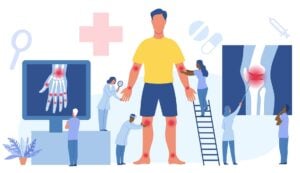

If you are interested in participating in a clinical trial, you will first have to undergo a screening process to determine if you qualify for the trial. Screening may begin over the phone or online – this is known as pre-screening. The full screening process involves a visit to the clinical site where your health will be appropriately assessed. Both stages will include a series of questions, including general, health-related and medical history questions.
Some people undergo pre-screening or screening and find that they are unsuitable and hence excluded from the trial, perhaps not even knowing why. The answer to this depends on the eligibility criteria. This article will provide examples of common eligibility criteria and an overview of the screening process.
To be eligible to participate in a clinical trial, potential participants must meet all of the “inclusion criteria” and none of the “exclusion criteria”. These criteria can be quite strict, especially for phase I and II clinical trials. The reasons for this are safety and accuracy. Early phase trials are generally restricted to very specific populations of participants as their purpose is to assess the safety of a new treatment and determine its effectiveness in a similar group of people in which the potential risk of adverse events is minimised, before trialing it in a larger, more varied population. It is important to minimise variation in the study population during early testing as too many variables can influence or cloud the results. Trialing a new treatment in a very different group of people makes it hard to know which individuals are the best responders. Clinical trials in later phases may have less strict selection criteria.
Common eligibility criteria include:
The more general criteria may be assessed by pre-screening, whereas in depth health or medical related criteria will most likely need to be assessed at a screening visit by a doctor.
There are various ways in which potential clinical trial participants may be pre-screened. Probably the most common method is by telephone. Pre-screening can also occur during a consultation with your doctor/specialist, or online via electronic questionnaire or survey, both of which usually lead to a telephone pre-screening call involving more specific questions.
In most cases, clinical trial investigators are doctors/specialists who treat patients in standard medical practices. If the doctor comes across a patient who they feel would be appropriate for a clinical trial and might benefit from it, they may discuss the trial with their patient and recommend them to the trial site for more information and screening.
Online questionnaires or survey tools may also be used to pre-screen interested people. These may be found on the trial site or the sponsor’s website, perhaps even via Facebook, or they may appear in the site’s newsletter, for example.
Online questionnaires/surveys are usually quite brief and general. You will be asked to enter your contact details (i.e. phone number, email address) so that you may be contacted by the trial staff if, according to your answers, you are eligible for further screening. However, if any of your answers deem you unsuitable, you won’t be contacted. You will need to contact the site yourself to find out why you weren’t eligible and discuss other appropriate clinical trials or register onto the site’s database so that you may be contacted about future relevant studies.
Sometimes people fill out online questionnaires and find out they aren’t eligible for some unknown reason, leaving them feeling dissatisfied. The reason for not revealing this is that it could lead to people providing false answers in order to pass the questionnaire. Common reasons for exclusion include age or weight restrictions or living too far from the trial site. To find out why you weren’t suitable, you will have to contact the trial site yourself.
Those who successfully complete the pre-screening questionnaire, or who have joined the site’s database in order to be notified about clinical trials (including past participants) and who are appropriate for pre-screening, will be contacted by the trial staff via telephone. Telephone pre-screening allows the study coordinator to ask more specific questions and gather important information relevant to trial participation, as well as provide more information on the trial itself and answer any questions. If the eligibility criteria are satisfied and no exclusion criteria are met, you will be booked in for a screening visit at the trial site.
At the screening visit, you will meet the study staff, particularly the clinical trial coordinator, who will be your primary contact, and the investigator (doctor). The coordinator and the investigator will provide you with information about the trial and answer any questions you may have. The investigator will then continue the screening process. The series of assessments required depends on the clinical trial protocol. Often required is a physical examination (e.g. height, weight, blood pressure, electrocardiogram) and a review of your medical history.
Validated health and/or condition-specific questionnaires may need to be completed (e.g. short form health survey, pain score, mental health assessment scales). Some trials require participants with a very defined condition / clinical presentation. Here are some examples:
Laboratory testing (e.g. blood tests, urine test) and/or diagnostic testing (e.g. x-ray, MRI, CT scan) may also be required. This will, however, require you to provide informed consent first.
Before any laboratory/diagnostic tests are performed or any sponsor documents are completed by an eligible person, a participant information sheet and informed consent form must be reviewed and signed. The information sheet and form will provide you with important information about the trial.
Before signing the form, it must be thoroughly reviewed and the trial should be discussed in depth with the coordinator/investigator, this includes asking as many questions as necessary. The form can be taken home to discuss with family, friends or other doctors and signed upon returning to the trial site if you decide to participate in the trial. (Note: This document is not a contract, it represents an agreement to participate in the trial and an understanding of what it will involve. You may withdraw your consent and leave the trial at any time.)
In the event that a person is found not to be eligible for the study, which may actually occur after providing consent to undergo laboratory/diagnostic testing, they will be told promptly and may then be asked if they would like to remain on the site’s research database where they may be contacted about potentially suitable trials in the future.
View our currently recruiting studies:
Register your interest for future studies:
© Genesis Research Services, 2023